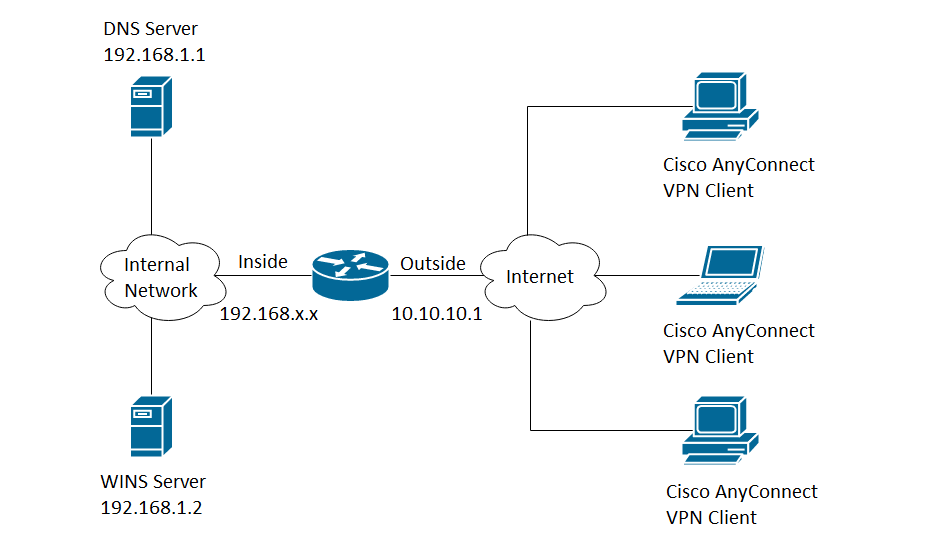Cisco Anyconnect Vpn Client free download - Cisco VPN Client, Cisco Legacy AnyConnect, Cisco AnyConnect, and many more programs. The Cisco AnyConnect SSL VPN has become the VPN standard for Cisco equipment, replacing the older Cisco IPSec VPN Client. Photoshop dmg file download. With the introduction of the newer 4.x AnyConnect, Cisco has made dramatic changes to their licensing and features supported. To sum up, when the Cisco AnyConnect VPN client connects, it blocks us from all-but-one address associated with the computer. We need the Cisco Client to stop doing that. Does anyone know how to make Cisco AnyConnect SSL VPN client stop doing that? Note: Firepass SSL VPN from F5 Networks does not suffer the same issue. What I want to know if there is a need to purchase additional licenses to allow SSL-VPN (client based AnyConnect) users to dial in. I don't need fancy features for AnyConnect users, just an ability to dial in and use internal resources. Licensing snapshot below: Cisco Adaptive Security Appliance Software Version 9.4(1) Device Manager Version 7.4(1).
OpenConnect is a cross-platform multi-protocol SSL VPN client which supports a number of VPN protocols:
- Cisco AnyConnect (--protocol=anyconnect)
- Juniper SSL VPN (--protocol=nc)
- Pulse Connect Secure (--protocol=pulse
- Palo Alto Networks GlobalProtect SSL VPN (--protocol=gp)
- F5 Big-IP SSL VPN (--protocol=f5)
- Fortinet Fortigate SSL VPN (--protocol=fortinet)
OpenConnect is not officially supported by, or associated in any waywith Cisco Systems, Juniper Networks, Pulse Secure, Palo Alto Networks, F5,or Fortinet, or any of the companies whose protocols we may support in the future.It just happens to interoperate with their equipment. Trademarks belong totheir owners in a rather tautological and obvious fashion.
An openconnect VPN server (ocserv), which implementsan improved version of the Cisco AnyConnect protocol, has also beenwritten.
OpenConnect is released under the GNU Lesser Public License, version 2.1.
Motivation
Development of OpenConnect was started after a trial of the Cisco AnyConnectclient under Linux found it to have many deficiencies:
- Inability to use SSL certificates from a TPM or PKCS#11 smartcard, or even use a passphrase.
- Lack of support for Linux platforms other than i386.
- Lack of integration with NetworkManager on the Linux desktop.
- Lack of proper (RPM/DEB) packaging for Linux distributions.
- 'Stealth' use of libraries with dlopen(), even using the development-only symlinks such as libz.so — making it hard to properly discover the dependencies which proper packaging would have expressed
- Tempfile races allowing unprivileged users to trick it into overwriting arbitrary files, as root.
- Unable to run as an unprivileged user, which would have reduced the severity of the above bug.
- Inability to audit the source code for further such 'Security 101' bugs.
Naturally, OpenConnect addresses all of the above issues, and more.
New protocols
Adding new protocols to OpenConnect is relatively simple, andadditional protocols have been added over the years since usingOpenConnect allows a developer to concentrate on the protocol itselfand most of the boring details about platform-specific tunnel managementand IP configuration, and handling of client SSL certificates, are alreadyresolved.
If you have a protocol which you think it makes sense to support inOpenConnect, especially if you are able to help with interoperabilitytesting, please file an issuein GitLab.
Consistent multi-protocol support

Wherever possible, OpenConnect presents a uniform API and command-lineinterface to each of these VPNs. For example,openconnect --force-dpd=10will attempt dead peer detection every 10 seconds on every VPN thatsupports it, even though the actual mechanism used may be protocol-specific.Protocol-specific features and deficiencies are described on theindividual protocol pages.
Special Notice

- Users must authenticate with Duo Security when logging in to the VPN service.
- These include users in the Student, Faculty and Staff, Student Health Center, and OIT Staff groups.
- This further protects Unity credentials and campus resources against cyber threats.
Access to NC State Computing Resources from off campus
- NC State students, faculty, and staff who are off the NC State campus are reminded to use the Virtual Private Networking (VPN) service when connecting to the campus network to access sensitive data.
- They can do so by installing Cisco AnyConnect SSL VPN client software on their off-campus machines and setting up a Virtual Private Network (VPN).
- Launching the AnyConnect VPN client requires a Unity ID and password to verify the user’s identity.
- Following verification, the program creates an encrypted network connection between the user and the NC State network, allowing access to restricted services.
- All users of the NC State VPN service are subject to NC State’s Computer Use Policy and VPN Acceptable Use Policy.
Installing and Using VPN
To install and use the Cisco AnyConnect VPN software, follow the link below for your operating system or device.
NOTE: Chrome OS is currently NOT supported.
Support
Cisco Anyconnect Ssl Vpn Client Download
- If you have the Cisco AnyConnect VPN client installed and can access internet sites but cannot establish a VPN connection to NC State, please contact the NC State Help Desk.

